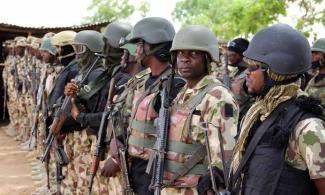
SaharaReporters gathered on Tuesday that the troops invaded the community on Monday morning, sacking residents of the community and looting properties and small businesses.
Residents of Nkalaha community in Ishielu local government of Ebonyi State are now fleeing from the community less than a week to yuletide after an invasion by troops of Nigerian Army, SaharaReporters can authoritatively report.
SaharaReporters gathered on Tuesday that the troops invaded the community on Monday morning, sacking residents of the community and looting properties and small businesses.
Nkalaha is a neighbouring community to the war-torn Ebor, Umujiovu and Mgbuji communities in Eha-Amufu Isi-Uzo local government area of Enugu State.
Some of the residents of Eha-Amufu communities over the vicious killings and destructions of their communities by armed herdsmen had gone to Nkalaha.
But presently, the military invasion of Nkalaha community has now forced residents of the community and Eha-Amufu internally displaced persons (IDPs) to flee from the soldiers and the herdsmen to Enugu town and Abakaliki, the Ebonyi State capital.
SaharaReporters had reported that on Monday, December 12, 2022, hundreds of troops of Nigerian Army invaded Obeagu community in same Ishielu local government area of Ebonyi State.
They had equally arrested and gone away with 10 residents of the community who were merely motorcycle riders and youths trained to defend the community after armed herdsmen invasion of the community in March 29, 2021 and October 13, 2022 that claimed 22 lives including children and women.
Meanwhile, neither the military nor the police or any other security agencies intervened while the over nine hours’ attack lasted.
Governor David Umahi of Ebonyi was forced to visit one of the gory sites 24 hours after the attacks.
"Now, the invasion of Nkalaha a neighbouring community with Obeagu and Eha-Amufu by Nigeria military while looked away when Fulani herdsmen and their collaborators from Agala community in Benue State, speaks volumes of the intention of the invasion," a community leader told SaharaReporters on Tuesday.
Although, SaharaReporters could not immediately ascertain why there was invasion of the community, residents who spoke to SaharaReporters, said that the soldiers deployed shot indiscriminately and looted several property.
In one the community's Facebook pages, one of the witnesses wrote: "Our community heads, councillor and commissioner must as a matter of urgency call a town hall meeting for what happened in Nkalaha today. Heard properties were destroyed and that guns were shot (sic) too. There must be immediate resolution of the problem so that our community will still remain peaceful.
"Also, the December tournament should be cancelled ASAP because of the security situation at stake."
Another community leader, Onyekachukwu Obeagu told SaharaReporters that residents were fleeing the military onslaught. "As I speak to you now, my community has been completely deserted. The soldiers destroyed houses and looted businesses. Those who are remaining in the community are hiding in the bushes while some have fled the community.
"I cannot authoritatively say whether anybody was killed or not. Probably after the invasion we will conduct head count. Why are soldiers not confronting armed herdsmen that have sacked several communities in Eha-Amufu and rendered the city that has a population of over hundred thousand desolate?"
A human rights organisation, International Society for Civil Liberties and Rule Law (Intersociety), recently accused the Nigerian and police of looking away when armed herdsmen invade Igbo communities especially in Enugu and Ebonyi States, while rolling tanks into communities in search youths and branding them IPOB/ESN.
Eastern Security Network ESN is armed militias of the Indigenous People of Biafra (IPOB), led by the detained Mazi Nnamdi Kanu.
ESN was established armed herdsmen insecurity following the complicit of leadership of security agencies in the South East to tackle their killings, rape and kidnapping of residents of local communities.